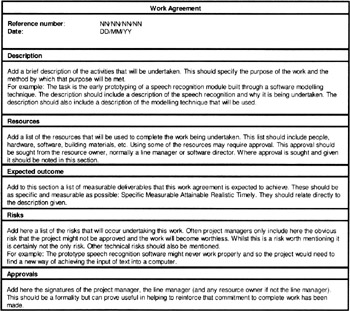THEME 3: START LONG-LEAD ACTIVITIES
One theme that is often overlooked during the early stages of advanced projects is the starting of activities that are likely to take significant time to complete. Often those involved in the project get caught up in the whirlwind that accompanies the business case and other project set-up activities. Project managers often feel that they need to get past the initial approval of the steering group before they can start any activities. Project managers assuming this are wrong.
Advanced projects require you, the project manager, to take risks. During the initiation stage of the project this means starting activities before they are approved. This doesn't mean that you should start every activity that the project requires. Instead you should carefully select those activities that need early attention. Once you have identified the tasks you should approach suitable line managers in the work area most likely to undertake the task. You then need to convince those managers to help you by giving you unapproved resources. The managers you approach are likely to fall into one of two categories. Either they will be very keen to help or they will be completely ambivalent to helping out.
Managers who are keen to start work should obviously be encouraged. However, you must be careful to ensure that they have well-defined boundaries. These boundaries must be sufficient to ensure that the managers concerned have a clear understanding of what is and isn't acceptable. This can be achieved through the use of a straightforward agreement. Figure 1.2 shows a template for a simple form that you can use to make this agreement. This form includes the basic information that should be discussed and agreed between the line manager and yourself.

Figure 1.2: Work agreement
Since this is an informal agreement it can be tempting to ignore it. However, it often proves to be an effective way of ensuring that work goes smoothly. It provides a focus for discussions between you and the line manager who is undertaking the work. It allows both of you a reliable format that ensures that all of the necessary topics have been discussed.
Completing the form can normally be achieved in a single meeting. It can be helpful if the form is completed electronically . This enables it to be quickly published and ensures that traceability is easy to achieve. The sections of the report are equal in terms of their relative importance. This means that you should give equal weight to completing each of the sections. When completing the form you should remember that this is only initial work. You should therefore set the timescales for completion appropriately.
At some stage during the initiation phase you should formally seek approval for this work from the project steering group. Often the first few meetings of the group are too busy to enable work agreements to be considered and therefore it may be the third or fourth meeting before approval is possible. Nevertheless the work agreement must be tabled for formal approval. As an absolute minimum there should be a review of the work agreement upon approval of the business case.
The same process should be followed for managers who are ambivalent to the project and who aren't keen to be involved in work at this early stage. Chapter 4 covers some of the methods that you can adopt to overcome the reluctance of these managers. Ultimately if they won't commit to giving unapproved resources you will have to delay the work and get authority from the steering group.
When the business case has been approved you should be able to terminate all of these work agreements. Normally this is a natural occurrence since many of the work agreements will have been superseded by other work orders or work packages. These work orders or work packages will have been developed as part of the macro plan production (see Chapter 2).
EAN: 2147483647
Pages: 69